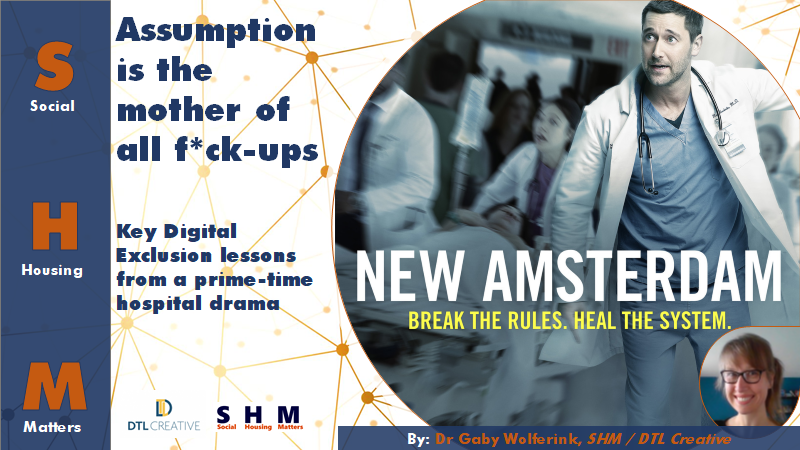
Last night I watched one of the current television series I follow, which did an episode on Digital Exclusion, and it hit the nail on the head. The series is New Amsterdam, and it is nothing new. It’s ‘another’ hospital drama. It’s not a masterpiece in any sense, but what attracted me to this series (yes, full disclosure, I admit, I’ve been watching Grey’s Anatomy for 17 years now too… sue me, I’m invested now) was the premise of the series. In fact, the premise of main character, Max Goodwin, in particular, whose approach to running a hospital as the medical director is to simply ask ‘how can I help?’ and encourages all his staff to start any consult with this question, to listen to patients, really listen, something that resonates with me very, very much.
However, asking the right, or, in this case, enough questions, is something that is easy to forget in situations of stress, even for the main character, and to go by assumptions. Assumptions coming from a good heart, but assumptions coming from a privileged context that without the lived experience of the intended beneficiaries are hardly ever the right ones.
I won’t ask you to go and watch the episode or series (but if you want to, it is on Amazon Prime, and it is the episde ‘Disconnected’, season 3, episode 9), so here’s a recap.
The Digital Divide – How can we help?
So, in this particular episode, patients were brought into the hospital who had fallen for a scam alternative to the covid vaccine, advertised to them by targeted flyers. Not just one or two, but around 20 from one single block in the city in one of the poorest areas of the city. The team went to the scene to see if they could prevent more people from taking the scam vaccine, or, if they already had, to convince them to come to the hospital. As we all know, health care in the US is not accessible to many, so many people won’t / can’t go to the hospital if they fall ill. But, with New Amsterdam being a public hospital, treatment would be free, like NHS treatment in the UK.
Assumption 1 – Access is all that is needed!
Max’ initial instinct was asking whether they checked online to see if the vaccine alternative was safe, because if they had, they would have seen that this was in fact a scam. The response he got from someone living in the block was that she rang her nephew, Nathan to ask about the scam alternative, because they had no internet in that block. No broadband access at all. But Nathan told her it was shady, so she didn’t take it.
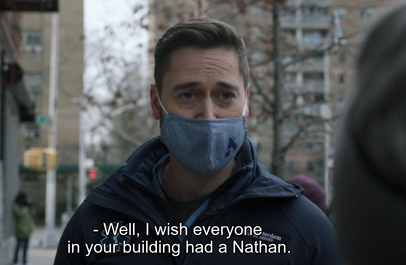
So, to Max it was abundantly clear, no doubt in this mind. An internet connection would solve the problem, it would prevent things like this from happening in the future. He put on his special suit and asked (no begged, with a bit of blackmail for the greater good perhaps) the head of the main telecom company to provide free internet to those who hadn’t. The compromise was that the people in the affected block would be provided with free broadband. Small wins, right?
Max returned to the hospital triumphantly, where on his soapbox he announced to the patients from the block that he had solved their problem: he had managed to get them free internet! Hurray!
I smirked, and then smiled as one of the patients asked: ‘Where do we pick up our computers?’. NAIL ON HEAD.

Max’s enthusiasm was stopped in his tracks, as he asked ‘you don’t have computers? No tablets?’
“You think everybody’s got smartphones?” an older lady asked. NAIL ON HEAD. Again.
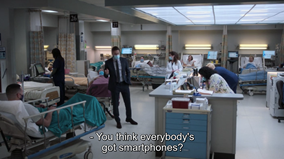
Assumption 2 – Access + Device is all that is needed!
It was back to the drawing board for Max. Now the (second) assumption that, following on from access to broadband, surely equipment was the final answer.
With all the goodness in his heart, Max devised a plan to ask for new equipment for his own hospital as the current equipment could be in some shape or form classed as outdated. By getting new equipment in, they could then justify, as a public hospital, donating the ‘old’ computers to the patients.
Max’ powers of persuasion seem to have no bounds. He succeeds in convincing the right people that at least some of the hospital’s equipment could do with an upgrade. He takes the laptops and tablets to the patients’ homes once dismissed, and proudly declares that he has now solved their problem.
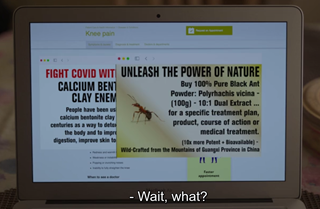
Standing behind one of the patients while she started browsing the internet for information on corona virus (remember why we got into this position, the inability to check or verify the legitimacy of the covid ‘vaccine’ they were offered), again he was very proud of himself. Like with his big ‘free internet’ announcement, this pride didn’t last long.
The woman soon found a lot of other cures and remedies that she enthusiastically pointed at. And because it was on the internet, surely it was true, because that was the problem, yes, that they didn’t have access to ‘the internet’. So, the implication was that, at least to those with no or very limited experience with and knowledge of the internet, whatever was on there must be true then.
With a big sigh and a lot of despair, Max tried to explain that while, yes, there was a lot of good and useful information on there, there was also a lot of false information on there, and that she had to be careful, and, and, and, … The woman didn’t understand; “This was on the computer you gave us!”, how then could she know what was true and what wasn’t? What use was this new computer to her to protect her from getting seriously hurt, or worse, again?
It’s never as easy as it seems if you don’t have (lived) experience or involve the people who have in developing solutions.
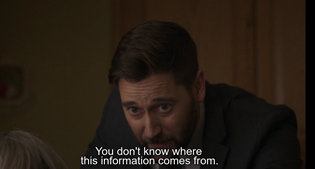
It dawned on Max that it wasn’t just as simple as providing material resources if people were to make the most out of the internet and any equipment that could connect them to it. Max, like myself, and you as well if you are reading that, is a well-educated digital native.
We know our way around it; we know (how) to question content that we come across, and we have the confidence not only to absorb, but also provide and input information when it comes to important things such as our health, finances and legal obligations. But for people who have never stepped a digital foot, dipped a single toe into that maze of information gathering and provision, how do you know where to start? How do you know you do the right thing? You don’t. You simply DON’T. Just like with anything, any skill, you have to learn, practice, get confidence. That doesn’t guarantee you won’t make any mistakes, but the chances are much, much slimmer.
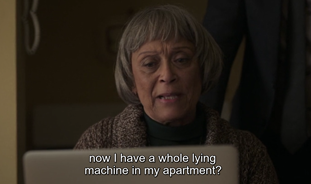
Until then, for those who need some extra support to get ‘into’ this whole internet thing, learning to take their first steps, but also for those who might be able to find their way around to gather information, but not to submit it, or, in fact, for those who in some instances just prefer a human touch, something extra clearly is needed.
The ‘final solution’
Like many other current TV shows, New Amsterdam deals with the covid pandemic in its fictional world. Like many other current TV shows, it shows the challenges faced by people in exceptional circumstances, and one of the things it does well is to not only show the problems, as was the entire idea behind the storyline so far of course, but also some suggestions of how to approach it, and, in line with the ‘how can I help’ approach, these suggestions are always person-centred ones.
In this case, with the access and devices, but with a maze of information, the key was to provide an easy accessible portal that people who were, like in many countries, asked to stay at home and not come into the hospital unless it was an emergency or an appointment.
In Max’s words,
I have been doing this whole thing backwards. I’ve been running around trying to get everybody broadband access without considering ‘access to what’. … [We] need a portal. A portal to information that people can trust.
Having access to broadband, to information, is a right. But, what I finally realised, is that it’s the quality of information that affects our quality of life, so let’s create a safe space outside the walls of this hospital … A fully integrated system with the information people need to make the right health care decisions. Just like walking through the doors of New Amsterdam, and all from the comfort of your home.
The portal was simplistic in design, provided up-to-date medical information, opportunity for video consults with healthcare professionals and support groups in times where people cannot meet up face to face together. And, because it’s a cheesy TV drama, the portal was called N.A.T.H.A.N. (remember the nephew?), adding a personal touch to the service as well. What’s not to like?
Digital Exclusion is ‘a thing’ – acknowledge it!
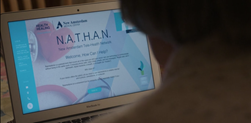
Of course, ‘just creating a portal’ isn’t as easy as they have made it out to be in a 40-minute TV drama. It seemed to have been designed and implemented in a few weeks, with multiple groups and users of various background using the service, with heads of departments taking calls. There is a limit to my suspense of disbelief. BUT, and there’s a big but (and I can not lie) in here.
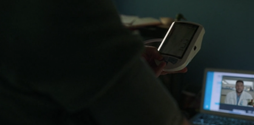
They could show this journey, the failures, the assumptions, and what a potential solution might look like over the course of those same 40 minutes. If they can make it this abundantly clear that digital exclusion and inclusion aren’t just a matter of access and devices, why are we still making the same wrong assumptions in the housing sector.
I’ve heard people in the housing sector, in decision-making positions say, literally, ‘digital exclusion is not a thing, there are internet connections in every single home we manage that I have been in. It’s all just rubbish.’ I could not have been any angrier than I was in that meeting, my qualifications as a Dr specialising in lived experiences and dangers of ignoring the effects of digital by default and with that digital exclusion on people’s lives completely that I had set out to them carefully and calmly, shoved off the table.
I had never expected to write an article about a TV series I watch in relation to digital exclusion and experience-informed service design, but here we are. Even if you’re not into this show or these kinds of shows, I hope you have enjoyed reading this (if you even made it this far, so, if so, thank you!) and taken away some lessons from it. If anything, bar the mistakes in assumptions that Max made throughout the episode, I hope that ‘How can I help’ will also become one of your favourite phrases, both in- and outside work.
Credits.
All images are screenshots from New Amsterdam and all copyright belongs to them.



